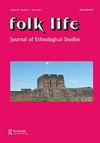The living history anthology, perspectives from ALHFAM
IF 0.1
4区 社会学
0 FOLKLORE
引用次数: 0
Abstract
witchcraft is a persistent doubt, rather than a belief system. These theories are a far cry from conscious decision and coherent faith. And it is not clear if Waters’ characterization of witchcraft as a willed belief system fits very well with the material he himself presents. When discussing the Scottish slander trial from 1862, for instance, he highlights the mixed, ambiguous, agnostic, and changeable attitudes towards witchcraft among the population (80–3). A similar point could be made about his discussion of the paradoxical scepticism of the unwitcher Alexander Henderson (103). It must be said that debates over chronology, causation, and how belief is conceptualized are perhaps inevitable in any book of this methodological, chronological, and geographical ambition, especially one dealing with the ever-contentious topic of harmful magic. As Waters reminds readers, witchcraft remains a matter of life and death today, and readers will find this book a provocative and entertaining read, whether they share his conception of witchcraft belief and its decline or not.生活史选集,ALHFAM视角
巫术是一种持续的怀疑,而不是一种信仰体系。这些理论与有意识的决定和连贯的信仰相去甚远。目前还不清楚Waters将巫术描述为一种意志坚定的信仰体系是否与他自己提供的材料非常吻合。例如,在讨论1862年的苏格兰诽谤审判时,他强调了民众对巫术的混合、模糊、不可知论和多变的态度(80-3)。在他对解谜者亚历山大·亨德森(Alexander Henderson,103)自相矛盾的怀疑论的讨论中,也可以提出类似的观点。必须指出的是,在任何一本具有这种方法论、时间论和地理野心的书中,关于时间顺序、因果关系以及信仰是如何概念化的辩论可能都是不可避免的,尤其是在处理一直有争议的有害魔法话题的书中。正如Waters提醒读者的那样,巫术在今天仍然是一个生死攸关的问题,读者会发现这本书是一本具有煽动性和娱乐性的读物,无论他们是否认同Waters对巫术信仰及其衰落的看法。
本文章由计算机程序翻译,如有差异,请以英文原文为准。
求助全文
约1分钟内获得全文
求助全文
来源期刊
CiteScore
0.30
自引率
66.70%
发文量
17
期刊介绍:
Folk Life: Journal of Ethnological Studies is a journal devoted to the study of all aspects of traditional ways of life in Great Britain and Ireland. The journal publishes original, high quality, peer-reviewed research in the form of unsolicited articles, solicited papers (which are usually selected from those read at the Society"s annual conference) and of members" papers (which are usually short reports of work in progress). Work published in Folk Life may include, for example, papers dealing with the traditional ways of life of other countries and regions, which may be compared to or contrasted with those of Great Britain and Ireland.

 求助内容:
求助内容: 应助结果提醒方式:
应助结果提醒方式:


